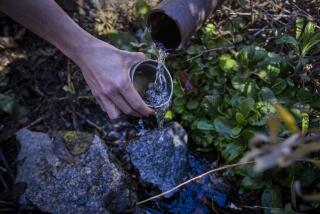Nevada Challenges Nuclear Waste Ruling
WASHINGTON — A decision to bury thousands of tons of nuclear waste in Nevada should be overturned because the government cannot assure the site’s geology will keep radiation from seeping into the environment, the state of Nevada has argued in a court filing.
The brief, filed in a suit challenging the decision to entomb the waste at Yucca Mountain, maintained that the Energy Department violated the 1982 Nuclear Waste Policy Act by resorting to “engineered barriers” to contain the waste.
In papers filed Monday with the U.S. Court of Appeals in Washington, the state argued that the Bush administration was “essentially abandoning” the 1982 law’s “mandate that the site’s geology form the primary isolation barrier” in selecting the Yucca Mountain site for waste burial.
Meanwhile, the federal government on Tuesday renewed its motion in U.S. District Court in Las Vegas to make Nevada turn on the water at the Yucca Mountain project. The government said it urgently needs water to provide a sanitation system, drinking water and showers for workers.
In June, a federal judge refused to order the state to turn on the water, saying that the government was not in danger of running out of water, but could return to court if it thought the project was running low.
“I think it remains to be seen if in fact their needs are urgent,” said Bob Loux, Nevada’s Nuclear Projects Agency chief.
Yucca Mountain is a ridge of volcanic rock and ash 90 miles northwest of Las Vegas, adjacent to the Nevada Test Site.
Last February, President Bush declared the mountain scientifically suitable and safe as the nation’s central repository for 77,000 tons of waste from commercial reactors and the government’s nuclear weapon program.
After Nevada challenged the decision, Congress endorsed the president’s declaration in July and overturned what could have been a veto of the site by Nevada. The Energy Department is seeking a license from the Nuclear Regulatory Commission and hopes to open the waste repository by 2010.
But Nevada, joined by the city of Las Vegas and surrounding Clark County, has promised to continue the fight in court and filed a number of lawsuits challenging the project.
In a 100-page filing in support of its lawsuit before the appeals court, Nevada contended that the 1982 law that directed construction of a federal nuclear waste repository specifically required that natural geology at the site “form the primary barrier keeping waste from people and the environment” over tens of thousands of years.
The suit also argued that the Energy Department conducted a “flawed environmental review” of the Yucca site, disregarded procedures required under the law in determining the site’s suitability and failed to assess adequately problems involving the transportation of waste to the site.
Yucca Mountain initially was chosen because Energy Department scientists believed it had the geology required to contain the waste. They later found it did not and adopted a “total system performance” approach in violation of the 1982 law, the state said in its suit.
Now, the suit said, the project relies extensively on man-made barriers -- metal alloy waste containers and drip shields, for example -- to keep waste from escaping.
The Energy Department had no immediate response to the Nevada court filing.
Nevada officials have made similar arguments repeatedly in public meetings and in outlining their opposition to the Yucca Mountain project over the years.
Energy Department officials have maintained that the site complies fully with the 1982 requirements, that it relies on geology to contain the waste and that the engineered barriers only provide additional protection.
Congress declared in 1987 that Yucca Mountain should be the only site to be considered for nuclear waste disposal. Since then, nearly $7 billion has been spent on studying the area’s geology and developing a waste package and design.
More to Read
Sign up for Essential California
The most important California stories and recommendations in your inbox every morning.
You may occasionally receive promotional content from the Los Angeles Times.










